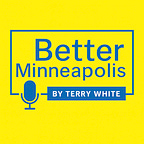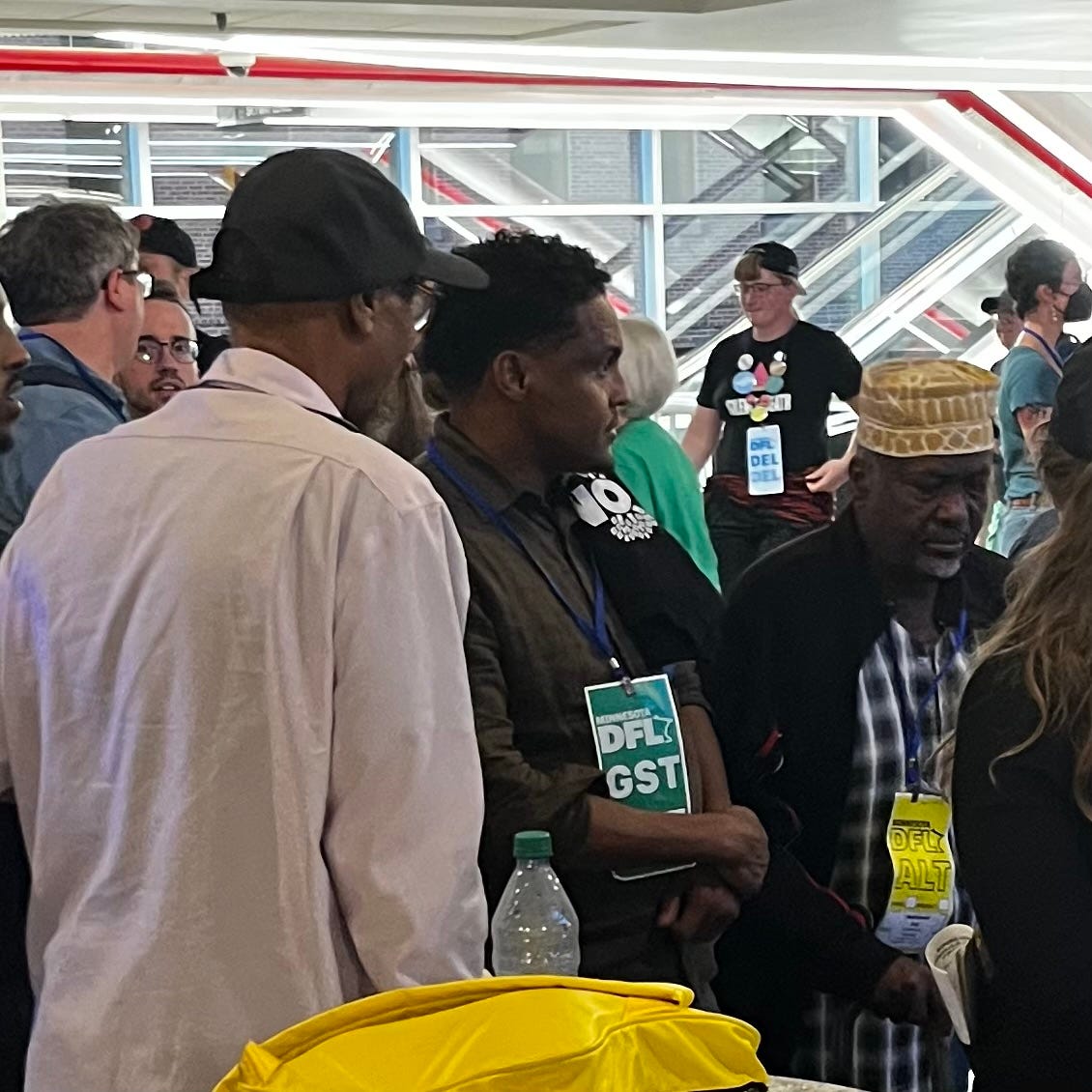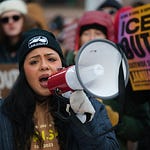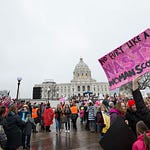Summary
At approximately 9:30 p.m. on Saturday, July 19, State Senator Omar Fateh was endorsed by the Minneapolis DFL for mayor. The vote was conducted by a visual show of badges following a late rules change, introduced by Council Member Aisha Chughtai at approximately 9:10 p.m., to bypass paper ballots.
According to the convention's credentials report, total voting strength at the time was 699—comprising 608 signed-in delegates and 91 upgraded alternates. For the vote to be valid, a quorum was required. The DFL defines quorum as a majority of registered delegates and upgraded alternates, which would amount to 350 individuals. The chair ruled—by visual assessment—that quorum was met. However, there is currently no way to verify this.
The only definitive count available will be the number of paper ballots submitted in the at-large park board election. As of 10 a.m. Monday, July 21, the Minneapolis DFL has not released those figures. It is unclear why. The vote calculation should not be complex. The lack of transparency raises questions about the legitimacy of the endorsement and the party's ability to organize a credible convention.
Based on our own (unverifiable) visual estimate, it appeared that at least 350 voting delegates remained in the room. Around the time Chughtai's motion passed, the Frey campaign sent a message urging supporters to leave in an attempt to break quorum and end the convention without an endorsement. That strategy appears to have backfired, leaving only the supporters of Fateh, Davis, and Hampton in the hall to cast their votes.
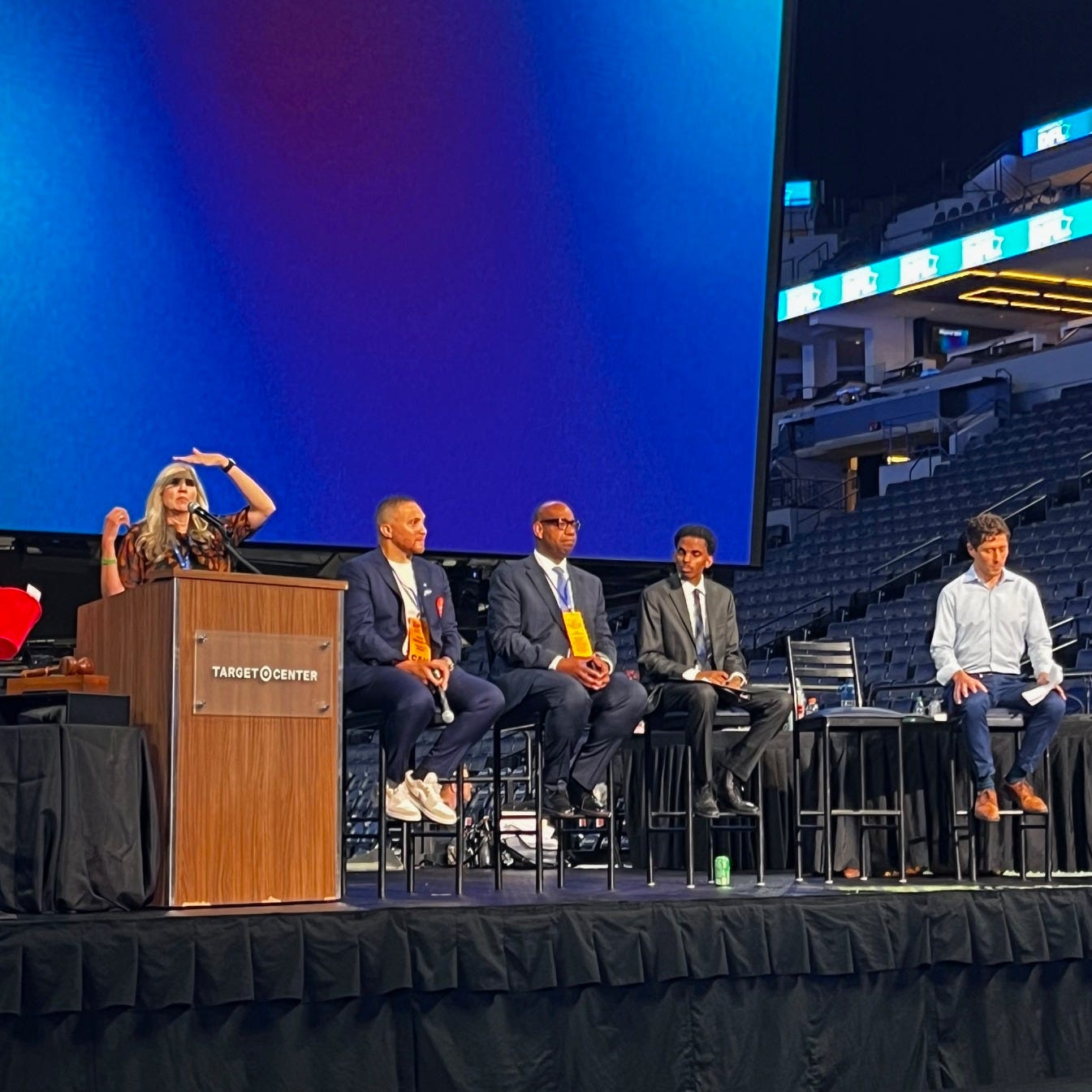
Recommendations
First, Mayor Jacob Frey would be well advised to wait for the final delegate counts and then acknowledge Omar Fateh’s endorsement. It is unlikely that a party willing to rush an endorsement vote will reverse its own decision.
Second, his campaign must do more to earn the support of Minneapolis voters. This will not be easy. He faces three strong challengers, each critical of his record on affordable housing, police reform, and overall city management. To win, he will likely need to persuade an additional 17 to 20 percent of currently undecided voters. Ranked-choice voting may work in his favor, as it has in the past.
Third, the campaign should consider holding a series of listening sessions—one in each ward—to hear directly from residents about where the city is falling short. Frey can and should cite his accomplishments, but more importantly, he must articulate a compelling vision for Minneapolis. Voters need a clear sense of how the city will change over the next four years if he earns another term. Rather than emphasizing broad agreement with his opponents, Frey might consider highlighting meaningful differences.
Reasoning
Even if the results are overturned, Mayor Frey’s best outcome at the convention was always no endorsement. The first round of electronic voting, though possibly flawed, gave him only 31.5% of delegate support. That outcome likely informed the decision by his campaign to pursue a quorum-denial strategy. The reported first-round vote totals were: Fateh 253, Frey 182, Davis 115, Hampton 23, and Short 2. Davis, Hampton, and Short failed to meet the 20% threshold required to advance to a second round.
There are several reasons to question the accuracy of these numbers. The head teller left mid-count due to a migraine. The ballot itself was altered during voting to add the “No Endorsement” option, which had been omitted. The process of upgrading alternates was chaotic and, by some accounts, potentially manipulated. In the final minutes of the convention, Council Members such as Jamal Osman were observed near the front of the upgrade line, possibly negotiating delegate status.
More broadly, the DFL caucus and ward convention system is outdated and unrepresentative. It excludes all but the most dedicated party members. Delegates at the convention represent only a small fraction of the electorate.
Despite these serious flaws—many of which justify public frustration—Mayor Frey’s campaign would be wise to respond with humility and a renewed focus on listening. The endorsement has already been publicized across social and traditional media, including coverage as far away as India. At this point, contesting the outcome is unlikely to resonate with most voters, especially those unfamiliar with the arcane procedures of the Minneapolis DFL. Even if valid, the argument that the process was unfair is unlikely to move the electorate. There may always be an asterisk on this endorsement, but explaining why is unlikely to shift public perception.
The bottom line: Omar Fateh is running an effective campaign. He had more visible support and energy in the room than Frey, regardless of the official count. As we’ve written before, the current convention system does not reflect the majority of Minneapolis voters. A new system, possibly involving a primary using Ranked Choice Voting, would offer broader participation. One model: candidates receiving 60% in the primary could secure the DFL endorsement, with the general election to follow.
Had such a system been in place, it is far from certain that Fateh would have earned the endorsement. His first-round support stood at 44%—well short of the 60% threshold. Neither Davis nor Hampton endorsed Fateh or asked their supporters to shift their votes. Both stated they intended to remain in the race until the end.
The Park Board Fallout
One consequence of the Frey campaign’s walkout from the convention was the loss of its delegates’ votes in the park board endorsement process. The remaining votes—conducted quickly via a show of badges to meet the 10 p.m. deadline—resulted in several endorsements:
Dan Englehart was endorsed in District 1 over Billy Menz.
Kedar Deshpande was endorsed in District 3.
Jason Garcia was endorsed in District 4 over Andrew Gebo, Paula Chesley, and Conrad Zbikowski. (Zbikowski has since filed a complaint, alleging that District 4 did not have a quorum.)
In District 5, Ira Jourdain was endorsed over incumbent and board president Cathy Abene.
Given the circumstances under which these endorsements were made, we hope all park board candidates choose to remain in the race. The outcomes at the convention may not reflect the results of the general election.
A resolution was also passed urging the city to divest from companies involved in the Israel-Hamas conflict. The exact language of the resolution has not yet been made available.
Conclusion
Fifteen weeks remain until the general election on November 4. The outcome was not decided at the Target Center. While it’s difficult to assign a specific probability to Mayor Frey’s reelection chances, they remain strong. He has won two prior elections without securing the DFL endorsement.
Still, this election unfolds under different conditions. His campaign will need to work harder to engage voters and counter a field of serious challengers. There are multiple strategic paths available, but contesting Omar Fateh’s endorsement risks becoming a distraction—one that may energize opponents more than it mobilizes supporters.

